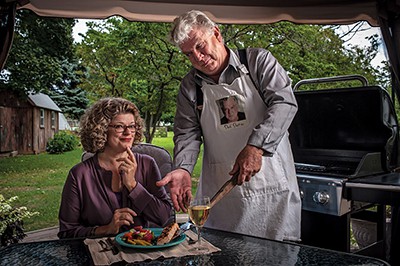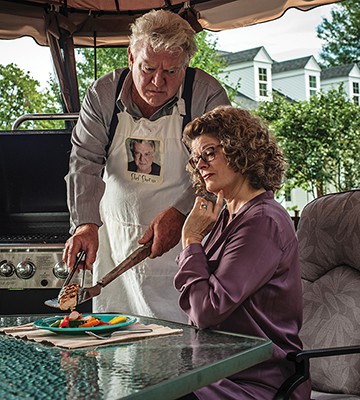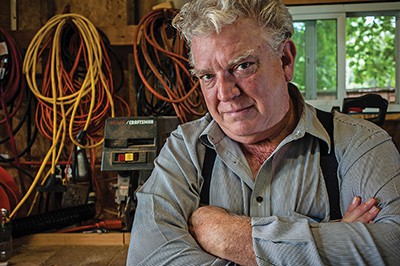FOR SOME MEN, TRADITIONAL ROLES ARE A THING OF THE PAST
STORY BY Jason Tinney PHOTOGRAPHY BY André Chung
On what would have been Ernest Hemingway’s 115th birthday, Dan Manning lounges on his deck overlooking a well-groomed yard large enough to support a full-scale flag  football match. He appears to be a guy who could handle himself on the gridiron: tall with bulk, strong hands, full salt and pepper goatee bordering on the edge of burly. Every inch of his physical presence suggests a fine specimen of masculinity. So, it doesn’t come as surprise when he tells me that in his younger years he “cowboyed” on a Texas ranch, riding horses and wrangling steers.
football match. He appears to be a guy who could handle himself on the gridiron: tall with bulk, strong hands, full salt and pepper goatee bordering on the edge of burly. Every inch of his physical presence suggests a fine specimen of masculinity. So, it doesn’t come as surprise when he tells me that in his younger years he “cowboyed” on a Texas ranch, riding horses and wrangling steers.
In my youth, cowboys represented the epitome of what a man was supposed to be. Other male role models were family members who earned livings as police officers and firefighters. But it was the 1983 film, “The Right Stuff,” that, for me, galvanized the concept of a “man’s man.”
In the closing scenes, Chuck Yeager’s NF-104 Starfighter crashes in the Mojave Desert. An ambulance nears the site
and the driver, spotting movement in the wreckage, says, “Sir … is that a man?”
Yeager, portrayed by Sam Shepard, emerges from thick smoke and flames, his face scarred from burns, walking with a parachute under his arm while chewing a stick of Beeman’s gum.
The officer replies, ” … you’re damn right it is.”
I’m 40 with an upstairs office in a farmhouse I share with my wife, who brings home the bacon, and our 15-year-old daughter. I cook, clean, do the dishes and laundry (disclaimer: a good portion of the aforementioned are outsourced to the kid). I still love “The Right Stuff,” but when I watch it now, I’m a bit embarrassed. I don’t know if it’s because I should be more like Chuck Yeager, or if it’s because my well-cherished notion of a man’s man has become a piece of fiction.
Dan Manning is an actor by trade who’s enjoyed a 40-year-plus career on stage and screen, including roles in “The Wire” and “House of Cards.” Manning, like me, is part of a growing cast of men reevaluating and redefining just what it means to be a man, when even the word “mankind” seems antiquated. We live in an ever-evolving culture where,  today more than 60 percent of U.S. college students are female, earning the majority of doctorates and master’s degrees. And where, as of 2010, according to the Bureau of Labor Statistics, women hold more than 50 percent of managerial and professional jobs — a first in this country’s history.
today more than 60 percent of U.S. college students are female, earning the majority of doctorates and master’s degrees. And where, as of 2010, according to the Bureau of Labor Statistics, women hold more than 50 percent of managerial and professional jobs — a first in this country’s history.
Manning and his wife, Lynn Watson, a theater professor at the University of Maryland, Baltimore County (UMBC), live on a quiet lane in northern Ellicott City. Members of a touring theater company, the couple first met in 1975. At that time, they went their separate ways, but 14 years later a chance encounter on a Manhattan street corner opened a new chapter.
“We decided to get together the following week and catch up on old times,” Dan says. “I guess we’re just not caught up yet.”
Given the mercurial nature of their profession, Manning and Watson knew sacrifices needed to be made if they were going to build a life together. When Watson received a Chancellor’s Scholarship to the University of California, Irvine, Dan left a successful off-Broadway production to follow her west. They married and while Watson pursued her master of fine arts degree, Manning worked full time, acting and doing carpentry. In 1990, Watson accepted a position at UMBC. And then things changed.
“My thinking was, when I finish graduate school and start teaching full time, then we can trade roles,” says Watson. “I can have a stable income and [Dan] will be free to do what he wants to do and not have to worry.”
Raised in a military family in southern West Virginia, the only idea more foreign to Manning than a woman as the breadwinner was a man cooking and doing the dishes.
Even so, he says, he was prepared for the shift. The changes that came from the Civil Rights movement, he says, “honed me for women’s rights long before we started redefining roles in our marriage.”
Manning says women’s equality makes sense both culturally and financially. “You had 50 percent of America’s workforce, brains, power and ability blocked out by chauvinistic heredity,” he says. The women’s movement also “freed men to be more nurturing — taking care of the home and children.”
Michael Heffren, a sociology professor and co-teacher of Women’s Studies at Howard Community College, believes the changing of gender roles is, perhaps, the biggest social change in American society over the last 40 years.
“My grandmother, who lived to be about 100 years old, never had a doubt about what the proper role of a woman was,” Heffren says. In her day, women worked in the home,  raised children, took care of the men. Today, he says, roles are more mixed, for both men and women. “There’s this confusion over what the proper gender role for what a man is supposed to be.”
raised children, took care of the men. Today, he says, roles are more mixed, for both men and women. “There’s this confusion over what the proper gender role for what a man is supposed to be.”
While Manning and Watson’s redefinition of their roles was both conscious and pragmatic, Heffren suggests that is not the norm.
Gender roles have been affected by the economy, he says. Over the last 30 or 40 years, he says, “good jobs that existed for blue-collar men have largely disappeared,” making it a challenge for men to support their families on one income. The men who traditionally held these jobs, he says, are experiencing a shift in strength as wage earners,
“and they’re probably less happy with it,” Heffren says.
“A lot of these guys are becoming stay-at-home fathers because they’ve been pushed out of the workforce and their wives have become the breadwinner,” he says.
Nathan Sowers (see Role Reversals, page 24) worked as an aircraft mechanic, but when he became a father, he made a choice.
His choice to quit his job, he says, while uncommon at the time, “is becoming a little more commonplace now.” But as Heffren indicates, the men in similar situations whom Sowers encountered had not necessarily chosen their lot. “It was out of circumstance, not so much out of choice,” he recalls. Most, he says, “had been laid off and were looking for another job.”
His New York drawl and badge may be intimidating at first, but when you get to know Jon Raimondi, a Montgomery County policeman who lives near Columbia, you reali
ze beneath the tough exterior, he’s a big softy, especially when it comes to his kids. Raimondi grew up in a traditional family, where his father came home from work at seven in the evening, ate dinner, spent a little time with the kids, went to bed and the next day did it all over again — five days a week. It left an impression on Raimondi. “I always wanted more time with my dad,” he says. And when his turn at fatherhood came around, he says, “I knew I had to spend more time with my kids.”
Raimondi, originally from Long Island, New York, tailors his shifts to maximize time with his children — a girl and two boys. He’s never missed a school event or a field trip.
As a law enforcement officer, he’s seen all kinds of men. “You do see some of those guys who — it’s all about work and that tough image,” he says. “I’ve always been the other way.”
Raimondi, who is just a year younger than I, agreed that we are part of a transitional generation when it comes to changing gender roles, not only at home but, for him, on the street.
The number of women on the police force has increased in the 12 years he’s been a Montgomery County cop, he says. “I guess my generation is right there in the middle,” when it comes to accepting women on the force, Raimondi says. “Now you see the new generation coming up — they don’t blink an eye at it.”
Next summer Dan Manning and Lynn Watson will celebrate their 25th wedding anniversary and they’ve never been happier.
“We worked it out,” Manning says. Their choices may run counter to social expectations, he says, “but it’s worked for us. Everything else is about building and maintaining a life together as two people and respecting the abilities and the desires of the other person.”
Jason Tinney’s latest collection of fiction, “Ripple Meets the Deep,” was released in October. He can be contacted at jasontinney.com *




